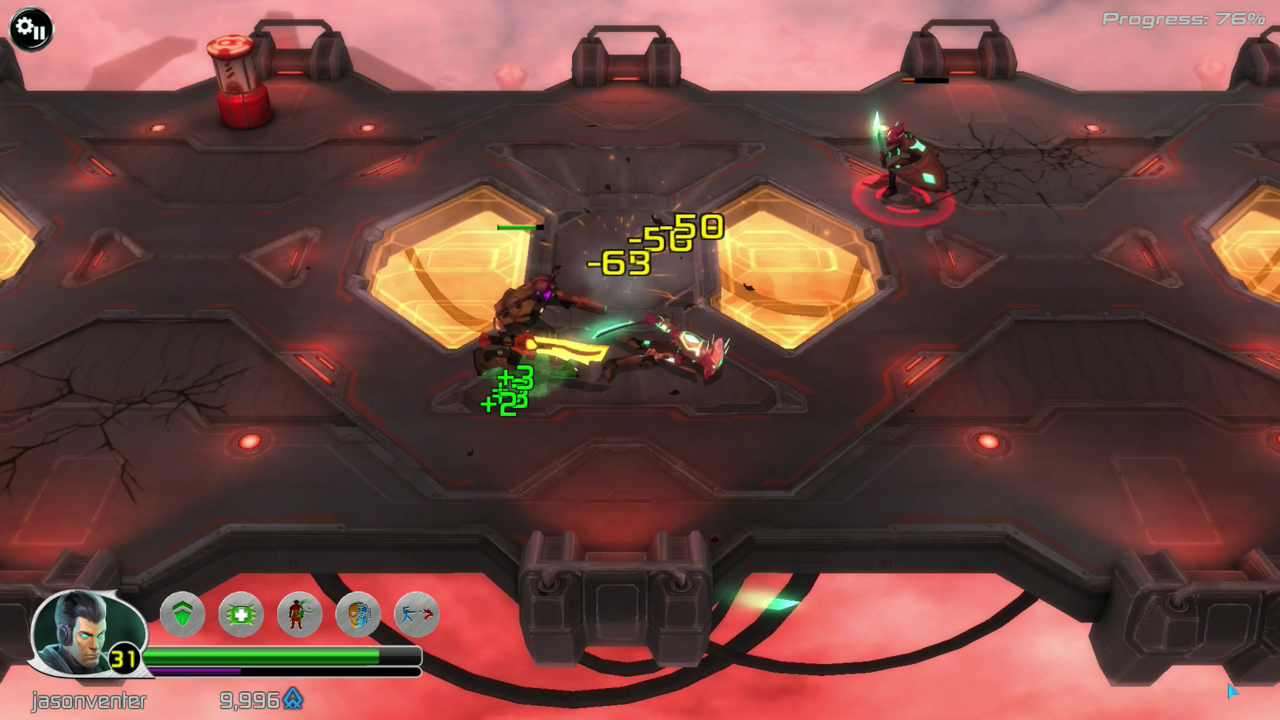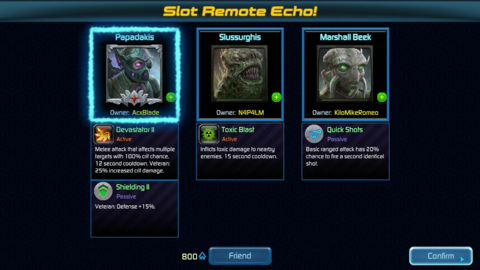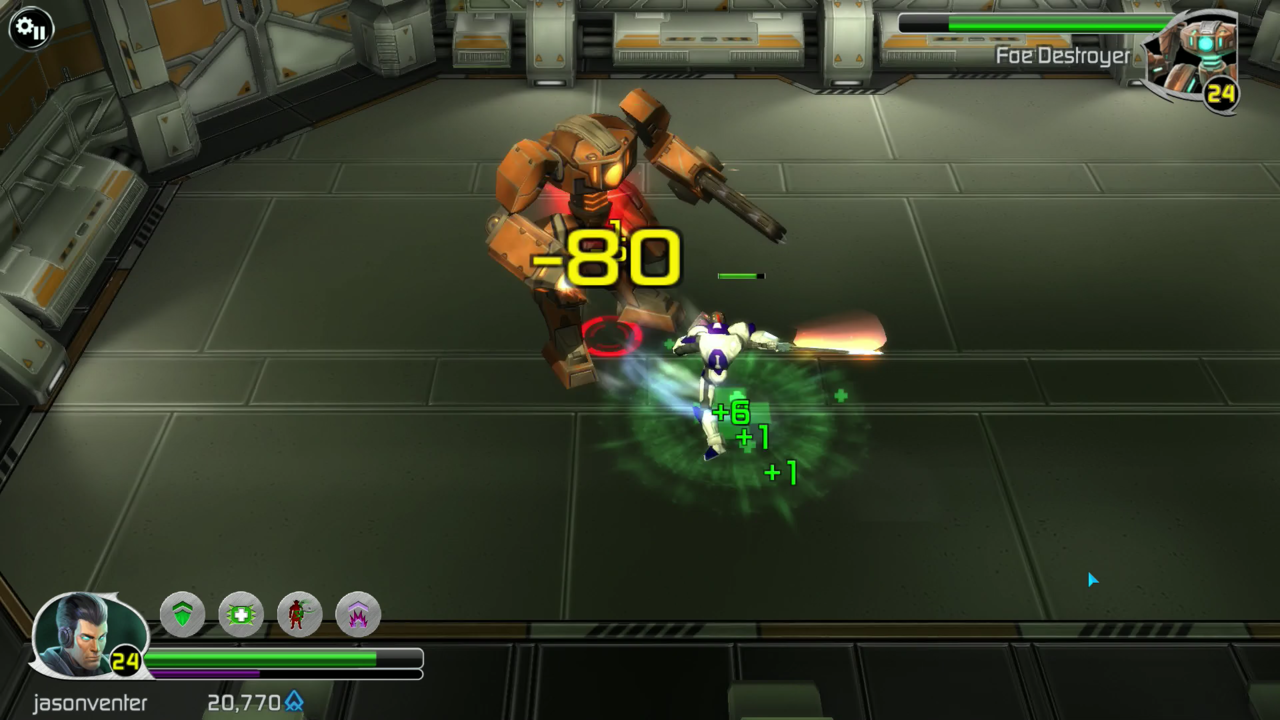Echo Prime is a brawler with role-playing game elements, and if you're into that sort of thing, odds are good that you've already played a number of better games it resembles. The developers at Robot Entertainment pulled together a variety of familiar elements to produce an accessible romp through sci-fi tropes, but enough issues also came along for the ride that it's difficult to regard the result as more than a disappointing misfire.
Your time with Echo Prime is mostly spent plodding along one series of corridors or another, relying on a few basic melee attacks, projectile weapons, and special abilities to vanquish any resistance met along the way. Sometimes there are special circumstances, such as a boss encounter or a mission wherein you must survive several waves of adversaries or defend a stationary target, but generally you simply advance from left to right and slash or shoot everything that moves. That's not unusual within the genre. What's unusual is the way most areas don't take more than a couple of minutes to clear. It's easy to boot up the game and drop into a mission within a half-minute or so, which is convenient if your time is limited and you just want to wind down by exterminating alien scum.

Thanks to some engaging character customization, which goes deep enough to feel mysterious but not so deep as to become overly confusing, you probably won't be in any particular hurry to end your first play session. A brief opening sequence acquaints you with the controls and then immediately introduces you to special entities called "echoes," who help you battle an alien race known as the Slivers. Echoes grant the brawny, nameless protagonist access to a wide range of passive or active abilities. One makes it possible to inflict more damage with projectile weapons, for instance. Another produces a temporary turret. As you gain levels, it's possible to equip multiple echoes at once, to suit either your overall style of play or the particular mission at hand. At first, the possibilities are intriguing.
There are more than 60 echo personas, but gathering them all requires luck and time. You acquire or enhance one of three echo cards whenever you level up a piece of equipment through frequent use in combat. More expensive gear begets better echoes, so there's incentive to spend a half-hour saving up for a sword or pistol you otherwise might not care about. Additionally, a lot of that equipment isn't even for sale until you reach a high enough level. Then you must spend another 10 or 15 minutes in battle to kill enough goons that you level up the chosen gear, and there's still no guarantee you'll be offered anything new. At least you can easily sample the possibilities ahead of that point. Missions let you temporarily equip one of three random echoes that a friend or stranger has accessed; plus, you can spend some of your hard-earned credits to designate a particular one from a full list, if someone you follow has already unlocked it. There's even a leaderboard, accessible from the title screen, which offers a record of who has acquired the most echoes. The feature serves as a nice way to inject a competitive element into an otherwise solitary experience.

Although the echoes would seem to bring variety to the game thanks to their number alone, the bulk of them are no more important to your heroic mission than a set of drapes. The abilities they grant all seem awesome, but they are hobbled by cooling periods that render them unavailable for 20, 40, or even 60 seconds at a time. After activating your favored ability at the start of a stage, you might not even have another chance to use it before you reach the exit. Some of the special moves are also underwhelming, designed to help you defeat only a handful of the 20 or 30 adversaries you might need to vanquish in a corridor. It's much simpler to make headway by gearing up with a few passive moves that offer persistent benefits, but then the game adds "too easy" to its list of shortcomings.
Perhaps the bigger issue at play is the stupid alien resistance. You can generally run through an area at a moderate clip, firing shots toward the right side of the screen, and that obliterates half your foes before they even have a chance to properly join the fray (if you haven't already dropped them without even seeing them). If you stop as enemies first come into sight, they often stand around like mannequins and absorb your shots. Even some of the beefier opponents might soak up bullets and collapse with nary a whimper, or they wait to rush you until half their life meter is depleted and they can't possibly survive long enough to get close and do any real harm. Attacking from a distance is also useful because when you take that tack, your adversaries may respond by springing into action one at a time. If you advance cautiously and use the architecture to your advantage (watch for enemies that rush you but get confused by pillars and such), you can avoid difficult encounters most of the time. The pathfinding in general is spotty, for that matter. Sometimes the hero inexplicably gets stuck when you clear a stage, and he makes a badly choreographed dash for the nearest exit.

Some of the above issues might not matter so much, if only you weren't compelled to spend so much time doing the same few things. That tends to make any shortcomings harder to ignore. There's not much in the way of unique scenery to admire as a distraction, either. You see the same few ice caves, metal platforms, elevators, and bunkers dozens of times over the course of the campaign and then dozens of times more if--as the game encourages--you keep going once you've cleared the last of the underwhelming story-based missions that mostly are distinguishable from the endlessly looping side missions only because they're labeled as such. Environments are beautifully illustrated, and the enemy animations all look good (especially the bosses), but a couple of dozen unique enemy units and maybe half that number of arenas aren't enough to prevent a 12-hour campaign from becoming a slog.
It's a chore to name a single feature or idea in Echo Prime that most experienced players haven't already encountered elsewhere, in a better game. There's an enjoyable experience lurking here somewhere, if you can endure the repetitive play and the limited volume of unique content that matters, and if you make and keep a promise to yourself not to abuse the weak AI. Otherwise, you're better off saving some other galaxy.